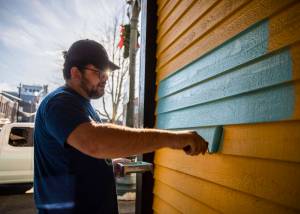Oregon bottle deposit rising to a dime next year
Published 1:30 am Tuesday, August 2, 2016
By Talia Richman
The Oregonian/OregonLive
PORTLAND, Ore. — Oregon’s bottle deposit will soon go from a nickel to a dime, an effort to raise redemption rates that have sagged in recent years.
In 1971, Oregon passed a first-of-its-kind “bottle bill,” which added 5 cents to the price of canned and bottled beer and soft drinks. To get the money back, a person had to return the bottle or can instead of throwing it away.
A nickel carried real spending power back then. For the first 15 years, return rates exceeded 90 percent, while the amount of litter along Oregon’s roads and in its landfills declined. But by 2009, only about three-quarters of bottles were redeemed, according to the Oregon Department of Environmental Quality.
To combat that problem, the 2011 Legislature decreed that if the redemption rate were to fall below 80 percent for two consecutive years, the 5 cent bottle deposit would be doubled.
In July, the Oregon Liquor Control Commission announced the latest numbers: about 68 percent for 2014 and 64 percent in 2015. The provision will kick in April 1, 2017.
The eight-month lag is important, said Christie Scott, the liquor commission’s spokeswoman. The state plans to use the time to work with manufacturers, beverage distributors and consumers to prepare for the change.
Cans and bottle labeling must be updated to reflect the 10 cent deposit. Redemption centers need to reprogram their machines. And the state has to educate customers.
“We want to make sure people know this is coming and aren’t surprised on April 1 when they take their six-pack up to the counter and it’s a 60-cent deposit, not a 30-cent one,” Scott said. “That’s why it’s not just snap your fingers and automatically it’s 10 cents.”
There’s also the issue of ridding shelves of bottles labeled with the 5 cent deposit mark before the change kicks in. Even if someone pays the lower rate, they’ll still receive 10 cents back come April 1.
“We’re going to take a hit as an industry,” said Joe Gilliam, president of the Northwest Grocery Association. “A lot of containers out there that are worth a nickel will suddenly be worth a dime the next day.”
That’s what happened in 2009, when the bill expanded to include bottled water. That change “didn’t kill us, but it was a cost to the system,” Gilliam said.
The commission will hold a “rulemaking hearing” to go over stakeholders’ concerns and questions, Scott said.
Oregon is one of 10 states with a bottle bill. Most have stuck with 5 cents, though Maine and Vermont offer 15 cents for liquor bottles, and California gives 10 cents back for bottles larger than 24 ounces.
Only Michigan has a 10 cent deposit, and its return rates consistently hover above 90 percent.
Oregon will be the first state to increase an established deposit amount, said Cherilyn Bertges, an Oregon Beverage Recycling Cooperative spokeswoman. The cooperative operates 16 BottleDrop redemption centers across the state and is planning to add four more before April.
“We do expect there to be an increase in return rates, but how much that will be is a good question,” Bertges said. “We don’t have an exact example, so it’s pretty much anybody’s guess what will happen.”
Though redemption centers handle about 40 percent of returns, Gilliam said, there aren’t enough of them to mitigate the soon-to-be increased burden for grocery stores.
He estimates the state needs another 15 centers to absorb what he predicts could be a 20 percent uptick in returns at grocery stores.
“It’s going to be tough on the retailer because we’re really maxed out at the retail level in the number of cans we take in today,” he said, noting that the average Oregon grocery store redeems 7,000 cans and bottles a day.
Doubling the deposit is going to increase the number of people who go through neighborhoods to collect others’ cans, Gilliam said, and it also may exacerbate fraud.
Already, he said, people from Washington and Idaho — states without bottle bills — cross the border to redeem cans they didn’t pay a deposit on.
“There’s concern that would go up as well,” he said. “There’s always someone angling to make a buck.”
Oregon’s historic bottle deposit system will soon see additional change. In 2018, it will be expanded to include “all beverage containers except distilled liquor, wine, dairy or plant-based milk, and infant formula.”
That means people will be able to get 10 cents back for beverages including tea, coffee, hard cider, kombucha and coconut water.
Part of the reason for the return rate’s fluctuation is the evolving purchasing power of the nickel. Though the cost of living has changed over the last 45 years, the bottle deposit hasn’t.
If it had, Bertges said, the deposit would be now be up to about 30 cents.
“Obviously we’re not jumping all the way to 30 cents, but this is an effort to make up for some of that,” she said. “It’ll renew that financial incentive a little bit.”
Ben Cannon, a former Oregon legislator who sponsored the bill, said he hopes the law he helped put in the books years ago has a positive impact.
“I would’ve been thrilled if the redemption rate had increased above 80 percent without the deposit going to the dime,” he said. “The point wasn’t to make a dime, it was to increase the number of containers being recycled.”
Frequent visitors to Safeway’s downtown bottle return had varying opinions on the upcoming change.
Robert Gimarelli saves his own bottles and comes almost daily to redeem them. He also picks them up at bus stops, on the street and at his apartment building.
“I don’t want to see them thrown away — they’re money, they’re gold,” said Gimarelli, 29. “It’s a good day, April 1. It’s more money in your pocket.”
But Deb Stone, 61, said the increase will make her life harder. She “dumpster dives,” and often spends three to four hours going through each of the eight trash rooms in her building.
“I’m not excited because I don’t see the cans being there anymore,” Stone said. “People will save them and take them in themselves now that they’re worth more. Sometimes I come here with $15 worth of bottles but I don’t think that’ll be available anymore.”




